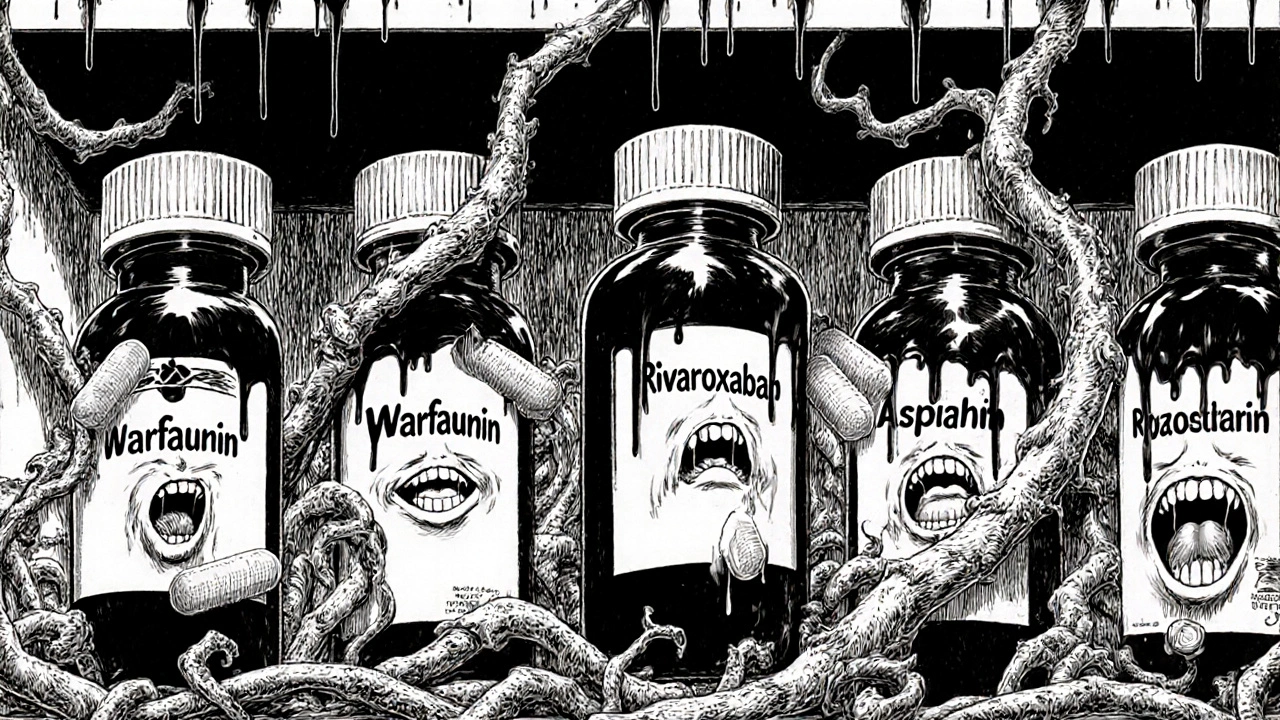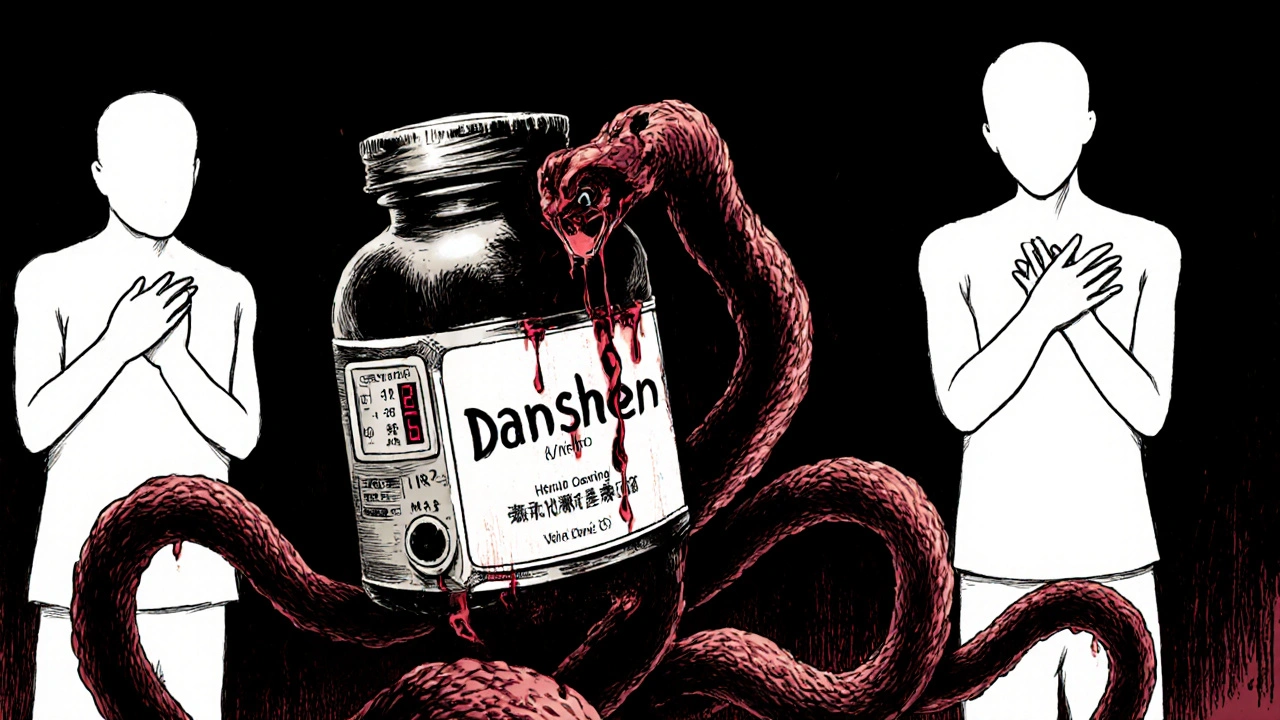Danshen & Heart Medication Interaction Checker
Check Your Medication Safety
Danshen (red sage) can cause dangerous interactions with heart medications. This tool helps you determine if your current medication is unsafe when combined with Danshen.
Many people turn to herbal supplements like Danshen because they believe natural equals safe. But when you’re taking heart medications, that belief can be deadly. Danshen, also known as red sage or Chinese sage, is a popular herb used in traditional Chinese medicine for heart health. It’s sold in pills, teas, and extracts in the U.S. and other Western countries. But here’s the truth: mixing Danshen with common heart medications like warfarin, rivaroxaban, or aspirin can cause life-threatening bleeding. This isn’t a theoretical risk - it’s been documented in hospitals, emergency rooms, and medical journals for over 25 years.
What Exactly Is Danshen?
Danshen comes from the root of Salvia miltiorrhiza, a plant used in China since at least 200 BCE. Today, it’s approved as a prescription medicine in China for heart attacks and strokes, often given as an injection. In the U.S., it’s sold as a dietary supplement - meaning it’s not regulated like a drug. That’s a big problem.
The active compounds in Danshen - tanshinones and salvianolic acids - work in multiple ways: they thin the blood, relax blood vessels, and lower blood pressure. Sounds helpful, right? But when those same effects clash with prescription heart meds, things go wrong fast. One study showed Danshen can inhibit platelet aggregation by up to 47% in lab tests. That’s close to the effect of low-dose aspirin. And unlike aspirin, there’s no standard dose for Danshen. One bottle might have 0.05% active ingredients. Another might have 5.2%. You have no idea what you’re actually taking.
Why Danshen Is Dangerous With Blood Thinners
The biggest danger comes from combining Danshen with anticoagulants. Warfarin (Coumadin) is the classic example. It’s been used for decades to prevent clots in people with atrial fibrillation, artificial heart valves, or deep vein thrombosis. Doctors carefully adjust the dose based on regular blood tests called INR. A target range is usually 2.0 to 3.0. Too low, and you risk a clot. Too high, and you bleed.
Danshen throws that balance out the window. Three well-documented cases from the Cleveland Clinic in 2001 showed patients on stable warfarin doses suddenly hitting INR levels above 8.0 after starting Danshen. One man’s hemoglobin dropped to 7.6 g/dL - a sign of severe internal bleeding. Another needed hospitalization after his INR jumped from 2.0 to 5.5 in just a few days. These weren’t rare flukes. A 2020 study in Taiwan found 17 similar cases between 2015 and 2019. All patients had INR levels spike from an average of 2.3 to 5.8 after taking Danshen.
The problem isn’t just warfarin. Newer drugs like rivaroxaban (Xarelto) and apixaban (Eliquis) are also affected. A 2022 NIH study found Danshen blocks the liver enzyme CYP3A4 and CYP2C9 - the same enzymes that break down these drugs. That means the medication builds up in your body. Your blood stays too thin. And unlike warfarin, there’s no easy way to reverse it. With rivaroxaban, you can use andexanet alfa in emergencies. With Danshen? No antidote exists. If you start bleeding internally, doctors have to treat the symptoms - not the cause.
Real People, Real Consequences
Reddit threads from r/anticoagulants are full of stories like this: “My INR went from 2.5 to 6.0 after my TCM practitioner prescribed Danshen with my Eliquis.” Another wrote: “ER visit after taking Danshen with warfarin - never again.” These aren’t isolated complaints. They’re repeated patterns.
One patient, a 62-year-old man with a mechanical heart valve, was doing fine on 5 mg of warfarin daily. After adding Danshen extract for two weeks, his INR soared past 8.4. He lost so much blood he needed a transfusion. He didn’t tell his cardiologist he was taking herbs. He thought it was “just a natural remedy.”
That’s the core issue: most people don’t tell their doctors. A 2019 JAMA Internal Medicine survey found only 28% of people taking herbal supplements mention it during medical visits. Why? They assume it’s harmless. Or they fear being judged. Or they’re told by a “herbalist” that it’s safe to mix. The result? Preventable emergencies.

Who’s Most at Risk?
Chinese immigrants in the U.S. are especially vulnerable. A 2021 study found 41.7% of them regularly used Danshen while taking prescription heart meds - and only 32.4% told their doctors. That’s a dangerous gap.
Older adults are also at higher risk. Many take multiple medications. Their livers process drugs slower. They’re more likely to have heart conditions that require anticoagulants. And they’re often targeted by supplement marketers who use phrases like “heart-healthy,” “natural alternative,” or “traditional remedy.”
Even if you’re not on blood thinners, Danshen can still interact with beta-blockers, calcium channel blockers, or statins. It lowers blood pressure. If you’re already on a drug that does the same thing, your pressure could crash. You could feel dizzy, faint, or fall. That’s not just risky - it’s life-threatening.
What Experts Say
There’s no debate among medical professionals. The Cleveland Clinic says: “It is contraindicated to use warfarin and Danshen concurrently.” WebMD classifies the interaction as “Major - Do not take this combination.” The Natural Medicines Comprehensive Database gives the same warning. Dr. Edward Phillips at Mayo Clinic says: “Danshen can interact strongly with some heart medicines, such as blood thinners, and may raise your risk of bleeding.”
Even researchers who study Danshen’s benefits are cautious. Dr. Jun Xu from Shanghai’s Institute of Materia Medica warned in The Lancet that Danshen’s complex chemical makeup makes interactions “unpredictable in clinical practice.” Dr. Robert Lee from Johns Hopkins put it bluntly in Circulation: “Without standardized formulations and clear interaction guidelines, Danshen will continue to cause preventable adverse events in cardiac patients.”

What Should You Do?
If you’re taking any heart medication - especially blood thinners - stop taking Danshen immediately. Don’t wait. Don’t “try it for a few days.” The damage can happen fast.
Here’s what to do next:
- Stop taking Danshen - no exceptions.
- Tell your doctor or pharmacist you were using it. Even if you stopped.
- Ask for an INR test if you’re on warfarin. If you’re on rivaroxaban or apixaban, ask about bleeding risk.
- Don’t replace it with another “natural” heart supplement. Many - like garlic, ginkgo, or ginger - have similar risks.
- Ask your doctor about safer alternatives if you want to support heart health. Diet, exercise, and proven medications are far more reliable.
There’s no safe dose of Danshen when you’re on heart meds. Not 50 mg. Not 100 mg. Not one capsule a week. The variability in the product, the unpredictability of the interaction, and the lack of medical oversight make it too risky.
Why This Keeps Happening
The global Danshen market is growing fast - projected to hit $1.84 billion by 2027. That’s because people want quick fixes. They see ads for “herbal heart support” and assume it’s harmless. But supplements aren’t held to the same standards as drugs. No FDA approval. No consistent dosing. No required warnings on the label.
In China, Danshen is regulated as medicine. In the U.S., it’s sold like candy. The FDA has issued multiple warnings about unapproved Danshen products. The European Medicines Agency requires labels to warn about anticoagulant interactions. But in the U.S., many bottles say nothing. You’re left guessing.
And that’s the real danger. Not the herb itself - but the illusion that it’s safe because it’s natural.
What You Can Do to Stay Safe
Always ask your doctor or pharmacist before starting any new supplement - even if it’s sold at a health food store. Bring the bottle with you. Don’t rely on memory.
Use the National Center for Complementary and Integrative Health’s herbal supplement questionnaire. It’s free. It’s simple. It helps you track what you’re taking.
And remember: if your heart medication came with a warning label, so should your supplement. If it doesn’t, that’s not a sign it’s safe. It’s a sign you’re on your own.
Heart health matters. But so does safety. Danshen might have helped people in ancient China. But today, with modern medicine, the risks far outweigh any unproven benefits - especially if you’re already on heart meds. Don’t gamble with your life. Skip the herb. Stick with what works.
Can I take Danshen if I’m not on blood thinners?
Even if you’re not on blood thinners, Danshen can still lower your blood pressure and affect how other heart medications work. If you’re taking beta-blockers, statins, or calcium channel blockers, mixing them with Danshen could cause dizziness, fainting, or dangerously low blood pressure. It’s not worth the risk unless your doctor specifically approves it - and even then, close monitoring is required.
Is there a safe form of Danshen?
No. There’s no standardized, FDA-approved version of Danshen available in the U.S. Products vary wildly in active ingredient levels - sometimes by more than 100-fold. Even products labeled as “standardized” aren’t reliably tested. Until the FDA regulates these supplements like drugs, no form can be considered safe for people on heart medications.
What should I use instead of Danshen for heart health?
Focus on proven strategies: regular exercise, a Mediterranean-style diet low in sodium and saturated fat, quitting smoking, and managing stress. If you need additional support, talk to your doctor about FDA-approved medications like aspirin (if appropriate), statins, or blood pressure drugs. These have decades of safety data. Supplements don’t.
Can Danshen interact with over-the-counter pain relievers?
Yes. Danshen can increase bleeding risk when combined with aspirin, ibuprofen, naproxen, or other NSAIDs. Even though these are OTC, they’re still blood thinners. Mixing them with Danshen raises your risk of stomach bleeding, bruising, or nosebleeds. Avoid combining them unless your doctor says it’s safe.
How long does Danshen stay in my system?
There’s no clear answer because Danshen isn’t standardized. But its active compounds can affect liver enzymes for days after stopping. If you’re switching from Danshen to a blood thinner, wait at least 7-10 days before starting the medication - and get your INR checked. Don’t assume it’s cleared just because you stopped taking it.


Erika Hunt
November 24, 2025 AT 17:30Okay, I just read this whole thing, and I’m honestly shocked-like, why isn’t this on every supplement bottle? I’ve seen Danshen sold next to ginseng and turmeric at my local Whole Foods, and the label just says ‘supports circulation’-no mention of bleeding risks, no asterisks, no tiny font warnings. I mean, if I took warfarin and threw in a random herb I bought online without checking, I’d be in the ER by Friday. And yet, people are just assuming ‘natural’ = ‘safe’? That’s like saying ‘organic soda’ won’t give you diabetes. The lack of regulation here is wild. I’ve got my mom on blood pressure meds, and she’s been taking ashwagandha for ‘stress’-I’m gonna send her this article and make her stop. Seriously, if you’re on any heart med, just don’t. Period.
Sharley Agarwal
November 25, 2025 AT 03:47People die because they trust herbs over doctors.
prasad gaude
November 25, 2025 AT 06:07Back in Mumbai, my uncle took Danshen after his angioplasty-said his Ayurvedic doctor swore it ‘cleansed the vessels.’ Three months later, he ended up in ICU with a GI bleed. The doctors had no idea he was taking it. He didn’t even think it was a ‘medicine’-just ‘herbal tea.’ I’ve seen this too many times. In India, we treat herbs like sacred gifts, not chemicals. But here’s the truth: chemistry doesn’t care if it’s from a temple or a Walmart. That plant has compounds that fight blood clotting-same as warfarin. Two forces pulling the same rope? It snaps. We need better education, not just fear. Maybe if pharmacies had herbal interaction charts next to the vitamins, people might pause before buying.
Jennifer Griffith
November 25, 2025 AT 12:30so like… is danshen like… the herbal version of coumadin? bc if so then why is it even sold??
Patricia McElhinney
November 26, 2025 AT 12:32It is unconscionable that the FDA permits the sale of Danshen without explicit, legible, FDA-approved labeling regarding life-threatening anticoagulant interactions. This is not a ‘gray area.’ This is corporate negligence disguised as ‘consumer freedom.’ The Dietary Supplement Health and Education Act of 1994 was a catastrophic mistake. Manufacturers are exploiting regulatory loopholes to profit off the ignorance of the elderly and immigrant populations who trust ‘natural’ labels without understanding pharmacology. This is public health malpractice. Until the FDA reclassifies Danshen as a drug-or bans it outright-more people will die. And when they do, the blame will be placed on the patient… not the $1.8 billion industry that sold them poison in a bottle labeled ‘heart support.’
Rachel Villegas
November 26, 2025 AT 13:54I work in a cardiology clinic and see this every month. A patient comes in with an INR of 7.5, bleeding from the gums, and says, ‘My cousin said Danshen helped her heart.’ We ask if they told their doctor-they say no. We ask why-they say they didn’t think it mattered. It’s heartbreaking. We don’t judge. We just say, ‘Thank you for telling us now. Let’s get you safe.’ If you’re reading this and you’re taking this stuff, please just tell your provider. We can’t help if we don’t know.
Aki Jones
November 28, 2025 AT 06:32Let’s be real-this isn’t about herbs. This is about the pharmaceutical-industrial complex protecting its profits. Danshen has been used for 2,200 years. The FDA doesn’t regulate it because they don’t own the patent. The real danger? The fact that Big Pharma spends billions marketing warfarin and Xarelto while suppressing research on natural alternatives. Did you know the NIH has studied Danshen’s anti-inflammatory properties since the 1980s? But you never hear about it because there’s no money in it. The ‘bleeding risk’ is exaggerated. If you’re on a low dose and monitor your INR, it’s fine. The real issue? Doctors don’t educate patients-they scare them. And the media amplifies fear to sell ads for ‘safe’ meds. Wake up. The system is rigged. Stop trusting institutions that profit from your illness.
Jefriady Dahri
November 29, 2025 AT 04:40Bro, I get it. My abuela used Danshen tea after her stroke-she’s 82, still walks every morning. But I also work in a pharmacy, and I’ve seen people mix it with Eliquis and end up in the ER. So here’s my take: if you’re gonna use it, don’t be quiet about it. Bring the bottle to your doctor. Say, ‘Hey, I’ve been taking this-what do you think?’ Most docs will say, ‘Stop it.’ But some, especially ones who’ve worked with immigrant communities, might say, ‘Let’s check your INR next week and maybe reduce your pill dose.’ Knowledge is power. Don’t hide. Don’t assume. Talk. ❤️